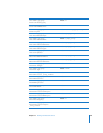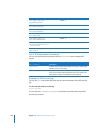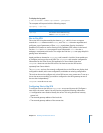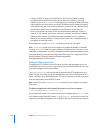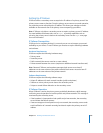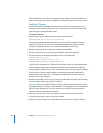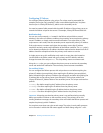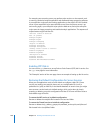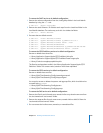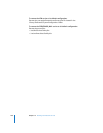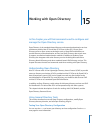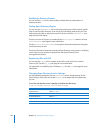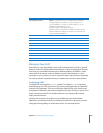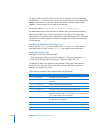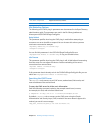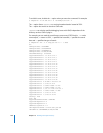
Chapter 14 Working with Network Services 249
To restore the DHCP service to its default configuration:
1 Remove the subnet configuration from the /config/dhcp folder in the local NetInfo
database by using the
nicl tool:
$ sudo nicl . -delete /config/dhcp
2 Remove the static Ethernet / IP Address static maps from the /machines folder in the
local NetInfo database. The easiest way to do this is to delete the folder:
$ sudo nicl . -delete /machines
3 Re-create the two default records:
$ sudo nicl . -create /machines/localhost
$ sudo nicl . -append /machines/localhost ip_address 127.0.0.1
$ sudo nicl . -append /machines/localhost serves ./local
$ sudo nicl . -create /machines/broadcasthost
$ sudo nicl . -append /machines/broadcasthost ip_address 255.255.255.255
$ sudo nicl . -append /machines/broadcasthost serves ../network
To restore the QTSS Publisher service to its default configuration:
Rename or delete these three files:
 /Library/Application Support/Apple/QTSS Publisher/Links.plist
 /Library/Application Support/Apple/QTSS Publisher/Poster Images.plist
 /Library/Caches/com.apple.qtsspublisher.plist
The libraries and templates reside in the/Library/Application Support/Apple/QTSS
Publisher/* folder. The content varies, based on what’s been uploaded:
To restore the QTSS service to its default configuration:
Rename or delete these two files:
 /Library/QuickTimeStreaming/Config/streamingserver.xml
 /Library/QuickTimeStreaming/Config/relayconfig.xml
You may also rename or delete the qtusers and qtgroups files, which should then be
recreated using qtpasswd.
 /Library/QuickTimeStreaming/Config/qtusers
 /Library/QuickTimeStreaming/Config/qtgroups
To restore the DNS service to its default configuration:
1 Remove the files for each forward zone, named similar to my.domain.com.zone from
the /etc/named.conf /var/named/* folder.
2 Remove the separate files for each reverse zone, named similar to db.10.1.0 from the
/etc/named.conf/var/named/* folder.
3 Do not remove the localhost.zone, named.ca, or named.local files.



